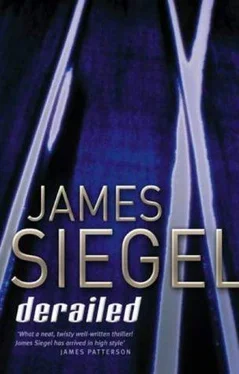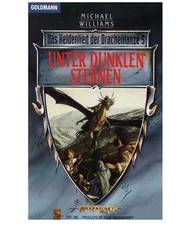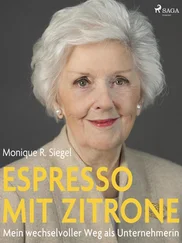Only I suddenly pictured Deanna in a store, being told the same thing. I had to call her. It was after three — she’d be home.
She picked up on the fourth ring, and when I heard her voice saying, “Hello,” I was overcome with a kind of gratitude. Grateful to God, I suppose—assuming that there was one, assuming that he’d care enough to see that I’d made it out of the Fairfax Hotel in one piece. Minus a whole nose, maybe, minus a lover, sure, but other than that, reasonably intact.
“You won’t believe the day I had,” I told her. And she wouldn't have believed it.
“What happened?”
“I broke my nose.”
“You broke your what? ”
“My nose. I fell down getting out of a cab and broke my nose.”
“Oh, Charles . . .”
“Don’t worry. It’s okay, it’s fine. The doctor set it and gave me enough codeine to sedate a horse. I’m feeling no pain.” That wasn’t true—I was feeling pain, but this pain was a kind of penance and tempered by that other thing I was feeling, which was unmitigated relief.
“Oh, Charles. Why don’t you come home?”
“I told you. I’m fine. I have a few things to do here.” Like say three hundred Hail Marys and lick my wounds.
“You sure?”
“Yes.” I was moved by the obvious empathy in her voice, the kind of empathy made possible only through years of sticking together through thick and thin. Even if we couldn’t communicate it lately — even if we couldn’t physically express it — it was there. It had always been there. And I nearly felt like confessing and throwing myself on the mercy of the court. But then I’d never have to, would I? Life was back where it started, before I’d looked up from my paper and noticed a white thigh and swinging black pump.
“One other thing,” I said.
“What?”
“I lost my wallet. When I fell out of the cab. I told you, you wouldn't believe the day I had.”
“A wallet’s just a wallet. I’m more concerned about you.”
“I already called the credit card companies and canceled them. Just wanted you to know — you better cut them up and throw them away. They’re going to send us new ones by tomorrow — at least they say they are.”
“Fine. Consider it done.”
I said good-bye, whispered, “I love you,” and started to hang up.
“Oh, I almost forgot,” she said.
“Yes?”
“Mr. Vasquez called.”
“Mr. Who? ”
“Mr. Vasquez. He said he had a business lunch with you at the Fairfax Hotel. He forgot to tell you something.
“Charles . . . ?”
“Yes?”
“Why didn’t he call you at the office?”
TWELVE
I called Lucinda at the work number she’d given me.
Hello, this is Lucinda Harris at Morgan Stanley. I’m not here at the moment, but if you leave your name and a brief message, I’ll get back to you.
So I did leave a brief message of sorts. Help. Not saying the actual word, of course, but then it’s the thought that counts.
“I’ve got to talk to you,” I said. “That . . . person from the hotel called me.” I tried to keep the panic out of my voice, the same way I’d tried to keep it out of my voice when Deanna had told me that Mr. Vasquez had called. I failed both times.
Are you okay? Deanna had asked me.
It’s the codeine, I'd said. It's making me woozy. I had wanted to say, It's Mr. Vasquez, he’s making me terrified.
Eliot came into my office to offer condolences about my nose. Maybe to try to patch things up, too — after all, we were friends, weren’t we? More than co-workers, than simple boss and employee. Eliot had been my rabbi all these years — hadn’t he promoted me and talked me up and provided me with more than generous raises? I’d been mistaken to blame Eliot for my dismissal from the credit card account — that had been their doing, not his. Ellen Weischler and her gang of four. Eliot was burying the hatchet and saying let’s be friends again.
And I needed a friend right now.
How much do you love me? I used to ask Anna when she was very small.
From the earth to the moon, she'd answer me. And sometimes, To infinity.
Which might be how much I needed a friend right now. A need as infinite as it was immediate.
I felt like unburdening myself to him. I'd like to tell you something that happened to me, I’d say to him. I know it’s hard to believe — I know it’s kind of ridiculous. I met this girl. And Eliot would wink and nod and smile, because Eliot had met girls before, too — three marriages to prove it and number three on life support these days.
I met this girl, I'd say, married, and Eliot’s smile would grow only wider, if that were possible, because he’d met married girls, too. We went to a hotel together — and here Eliot would lean in even closer, all ears, because was there anything quite as delicious as listening to a buddy give up the details, other than recounting the details yourself?
We went to a hotel together, I'd continue, only when we got to the room, someone else came in there with us.
And Eliot would lose that smile. Because this story took a vicious left turn and ended with this someone who came into our room raping the woman and calling my house. Talking to my wife.
Eliot asked me if something was the matter.
“No,” I said.
“Maybe you ought to go home,” Eliot said. “You look a little pale.”
“The nose,” I said.
“Yeah — the nose doesn’t look so good.”
“No.”
“Well, go home, then.”
“Maybe I will.”
Eliot patted me on the back — friends again, after all.
So I went home.
Why did he call you at home, Charles?
To prove that he could, Deanna.
I took money out of petty cash to pay for the train ride — the scene of the crime. The crime of coveting — another man’s wife, another man’s life. One night when I was eight years old and my parents’ constant sniping had reached a full-out conflagration, I’d packed my football helmet with a change of underwear and announced I was running away from home. Down the block I went — one block, two blocks, long enough to realize that no one was going to be coming after me. Eventually I stopped amid the swirling autumn leaves and started back. Thirty-five years later, I’d run away from home again. But this time I was running back.
My cellular phone rang. For a second, I wondered if it was him — my business associate from the Fairfax Hotel. But it couldn’t be him, he didn’t have the number. But someone else did.
“Hello,” Lucinda said.
She sounded different from this morning. Emotion was back in her voice after all, only a different kind from what I was used to. Dread, I’d say. First dead, then dread, all in the space of one afternoon.
“He called my house, Lucinda,” I said.
“Welcome to the fucking club,” she said.
“What?”
“He called mine, too,” speaking in a whisper, as if she were trying to keep someone else from hearing. Was her husband somewhere in the house?
I’d been very much hoping that Mr. Vasquez hadn’t called my house. Or that a Mr. Vasquez had, but that it was simply someone who’d found my discarded wallet in a vestibule of the Fairfax Hotel and called as a Good Samaritan. Or for a reward. Ridiculous, maybe. But there was always hope, wasn’t there?
Not anymore.
“You spoke to him?”
“Yes.”
“What did he want?” I asked. That, after all, was the million-dollar question here — you have to know what a man wants before you know what to do.
Читать дальше












